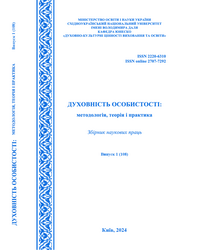FEATURES OF TEACHING PHILOSOPHY FOR STUDENTS OF THE FACULTY OF SPECIAL EDUCATION AND PSYCHOLOGY
DOI:
https://doi.org/10.33216/2220-6310/2024-108-1-206-214Keywords:
philosophy, norm, deviance, learning strategies, discourse, subjectAbstract
The proposed article presents a meaningful justification of the specifics of philosophy teaching strategies for students of the faculty of special education and psychology.
The need to overcome the limitations of their own specialty by turning to a more generalized theoretical discourse is proven. The main dispositive strategies were studied, and it was found that philosophy rejects the fragmentary study of the personality as a set of reactions or social roles, and considers it in the way it creates its own existence in the world, which lives here and now. In order to understand such a person, it is necessary to show students, psychologists and special education teachers its main dimensions: ontological, social, axiological, to which the concept of norm belongs.
It is shown that the problem of the conceptualization of the norm arises in connection with the comprehensive crisis of modern society, the forms of which are diverse - the strengthening of totalitarianism, terrorism, war, and the growth of deviant behavior. The idea of the norm and deviance is extremely important not only philosophically, but also psychologically and defectologically. The problem is to reveal the ontological and discursive specificity of the conceptualization of the norm problem to the students of the faculty of special education and psychology in a philosophical context.
The work presents the main options for understanding the norm in the modern scientific paradigm, and the well-founded advantages of the humanist position, for which the norm is a self-actualizing and self-improving subject.

